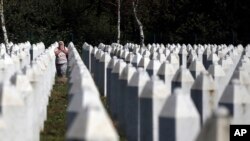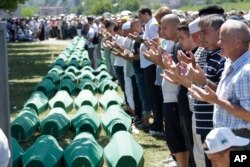Senior U.N. Human Rights officials condemn the decision by the Republika Srpska National Assembly in Bosnia and Herzegovina to take back its endorsement of a report acknowledging the massacre of thousands of Muslims in Srebrenica.
U.N. Special Adviser on the Prevention of Genocide, Adama Dieng, warns the decision by the Republika Srpska National Assembly to revoke its endorsement of the 2004 Srebrenica Commission Report is a step backwards for Bosnia and Herzegovina.
He says it undermines the rule of law and efforts to achieve justice for victims of crimes committed against people of all ethnicities during the 1992-1995 Bosnian war. The High Commissioner for Human Rights, Zeid Ra-ad al-Hussein agrees.
He says this action will worsen the divisive, nationalistic rhetoric ahead of the general elections in October. His spokeswoman, Ravina Shamdasani, says this decision will disrupt reconciliation efforts among the splintered communities.
“The 2004 Srebrenica Commission Report established that from the 10th to the 19th July 1995, between 7,000 and 8,000 Bosniaks went missing in the area of Srebrenica," she said. "It also found that more than 1,000 Bosniaks were killed during this period. Two international courts have determined that this massacre of Bosnian Muslims constituted genocide.”
The war in Bosnia and Herzegovina broke out after the breakup of Yugoslavia, pitting Bosnian Serbs, Croats and Muslims against each other. When it ended in 1995, around 100,000 people had been killed and more than two million displaced, making this the most devastating conflict in Europe since the end of World War II.
High Commissioner Zeid accuses the Srpska Parliament of withdrawing from the agreement for political gain ahead of the October elections. He says he fears it will increase existing tensions, divisions and mistrust in the country.





